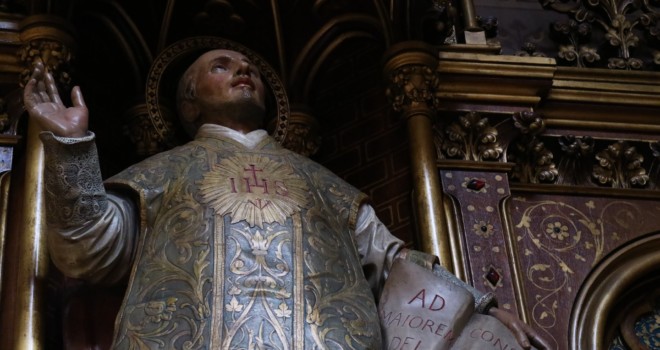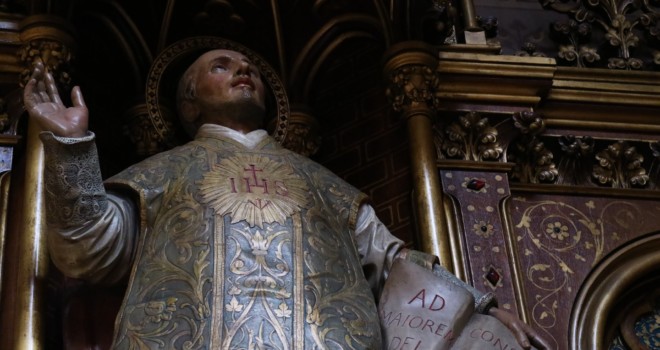This past Sunday we were presented with beautiful Mass Readings from the Prophet Amos, St. Paul, and Our Lord, sending His Apostles out to evangelize the world. As has been the case my entire life, the fact that these particular Mass Readings from Sacred Scripture point clearly to the ministerial priesthood, was ignored and instead I heard yet again how all vocations are the same. This is not in line with the Church’s understanding of the hierarchy of the supernatural order, but it is what we have been subjected to for decades as we have embraced a bland, boring, uninspiring, and lifeless sameness for the vocations.
In an attempt to make married couples feel better about themselves and in order to get rid of all of those “clericalist” tendencies of the hierarchy—some of which are genuine and others which are illusions—there has been an inordinate emphasis on the common priesthood, which is precisely why we no longer understand that reality is hierarchical or the nature of the ministerial priesthood. Why become a priest if all vocations are the same? This loss of the hierarchical nature of the supernatural order in favor of sameness is not what the documents of Vatican II call for in practice.
We are all made in the image and likeness of God and are equal in dignity, but we are not all the same. Mysteriously, God seems to love some souls more than others. He creates certain souls who are made for tremendous heights in glory that most of us never attain. He loves Our Blessed Mother above all creatures and St. Joseph second to her.
Many Catholics today find this offensive because we have embraced a rather Protestant view that everyone is the same. God loves us all equally. He made us to be the same. There are many reasons this view is destructive to the beauty of the Church. First, it betrays a lack of humility on our part. If we are unwilling to accept and admit that there are certain souls who achieve levels of greatness we cannot then we need to spend serious time in prayer asking God for humility. If we view the priesthood and religious life as a threat to our vocation in the married state or single life, then we are misunderstanding the hierarchy God has created and the purpose of those vocations.
The supernatural order places the spiritual life above the material life. This is why the begetting of children in the natural order through marriage falls lower in the supernatural hierarchy than the spiritual generation of the priesthood. It’s simply a matter of what is higher. The spirit always takes precedence above the material. There is no conflict here or power struggle. Both forms of begetting are gifts. Both are necessary, but one is higher in the supernatural order.
Rather than see our vocations as being in competition with one another and seeking to create a false sameness, we need to embrace the beauty of this structure and come to understand why the Most Holy Trinity operates this way in the Church. The call to marriage is the primary vocation God gives to His people. It is right, good, and beautiful for families to build up the domestic Church and to build up the Mystical Body through their union and through an openness to children. This allows the Church to grow and flourish. It also allows all vocations to be lived within the Church through more and more individuals answering God’s calling in life.
A Higher Purpose
The priesthood and religious life have an essential higher purpose within the Church that is for the edification of those of us in the married state or single life. They lead us away from the things of this life that so often distract us from the glories of heaven.
Those called to the priesthood or religious life exist to help raise our eyes to heaven. Not only for their own sanctification, but for the sanctification of the whole Church.
The more a soul is called to give up for God, the higher the calling in the supernatural order. Priests and religious sacrifice the goods of this life to varying degrees in order to live in full union with Christ now, not just in heaven. One cannot possibly claim that giving up family and married life to live entirely for God is lower than the married state, or even the same. Our culture places romantic love and sex above everything else. In the Church, we place God above everything else. Those called to the priesthood and religious life are living more closely to how we will live in heaven, so their calling is higher in the supernatural order.
These vocations remind us that the goods of this life are a gift, but we must become detached from all of them. Eventually, spouses learn the agonizing truth that we must become even detached from one another through death in order to reach the higher union we are made for. There, with our loved ones in heaven, we dwell in communion together with the Most Holy Trinity. Marriage ends at death because we are made for God alone—to dwell in communion with all the angels and saints, not just our own families.
The only soulmate we can ultimately have is Jesus Christ. Only He can make us truly happy, and only He can sanctify our marriages. More couples would find greater happiness if they came to understand that no human being—not even husband or wife—can ultimately make us completely happy. Only God can fill this longing within our hearts. Priests and religious point us to this reality and we need their example.
Something to Celebrate
The difference in degree between the vocations is something we should celebrate and embrace. We should be thankful for the witness of those within the Church who have forsaken the things of this life to spiritually generate children in the supernatural order of grace as priests do, as well as the witness of religious who show us the joy of a life lived entirely for God.
Many of the difficulties in this area we face in the Church today have to do with an inordinate emphasis on the material. We have lost the beauty of the supernatural order God has created and fallen into the trap of a lifeless sameness and materialism. This mentality paralyzes our parishes. We cannot offer any programs unless we tailor it to everyone. We must be open to and love everyone the same. This is completely impossible and ignores human nature. Even Christ Himself does not love everyone the same. He loves all people, and we are called to do the same in our own lives, but this does not imply that love will be the same with everyone. Sameness is completely uninspiring.
There was a hierarchy in Our Lord’s relationships while He was on earth. There is a hierarchy in our own lives. We do not need to apologize for the fact that we love people differently and certain people more deeply. Love is hierarchical. This mentality is harming the Church and leading us away from the depth, breadth, and height we are meant for in Christ. We cannot continue to fall into this trap that everything must be the same. This leads to shallowness and mediocrity.
The Example of St. Therese
Instead, like St. Therese, we must aspire to the love and the vocation God has made for us. Towards the beginning of her autobiography, she examines this very question. In her great humility, she sees that she is not a “great” saint in the making, like St. Teresa of Avila, the great reformer of the Carmelites and Doctor of the Church. Rather, St. Therese saw herself as small and in need of a “little way” to God. She did not fall into jealousy or its deadly cousin envy. St. Therese set out joyfully on the path before her. She had the example of her saintly parents, the gift of correspondence with missionary priests, and her natural sisters and religious sisters; who, at times, were terrible to her. Providentially, through her deep humility, St. Therese became a great saint and a Doctor of the Church. She embraced God’s plan for her life, not her own.
Our calling in this life is not to be like everyone else. We are not called to be the same. The vocations are not the same and some are spiritually higher than others. We cannot fall into the sins of jealousy or envy when we look at those whose gifts from God are higher than our own. We must humbly seek the will of God in our own lives and look to those souls around us who have been called to give more to God in this life through a relinquishment of the pleasures of the flesh and material goods. They are our guides on the path to spiritual detachment and disinterested love that allows us to become the saints we are each made to become in our particular vocation. Let us rejoice in the beautiful differences and degrees in the vocations God bestows upon His people in the Church.
✠
Photo by Dag Heinrichowski on Unsplash












